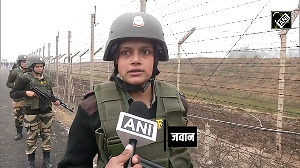Colour TVs. Gas stoves. Rice at Rs 2 a kg. Land for landless. These were some of the promises that helped the Dravida Munnetra Kazhagam trounce the Jayalalitha-led government in the last assembly elections in Tamil Nadu.
Though elections promises often remain on paper, Tamil Nadu Chief Minister M Karunanidhi was always keen on delivering them. A year later, 'land for the landless scheme' is changing the face of rural Tamil Nadu.
The land scheme was Karunanidhi's pet project. The proof of the pudding is in the eating: at least 1,653 acres of land has been distributed to 1,661 beneficiaries in Tirunelveli, a southern district in Tamil Nadu.
Another 3,007 acres was to be given, but the government backed out after finding the land was rocky and unfit for cultivation.
So keen was the government that it sent a team to West Bengal to study their land distribution schemes.
The beneficiaries were selected by the government on two grounds. They should own no land, and they have to be poor. They also have to be local residents.
There were conditions as well. Beneficiaries cannot sell the land for the next 30 years. And the land will only be registered in a woman's name. One can pledge the land to a bank, if they need money to cultivate.
Interestingly, some of the encroached land has also been regularised. In this category, 391 persons have been given 323 acres. At least 2,600 acres of private land, which has not been tilled due to unfavourable conditions, was also ploughed.
"Another 4,406 acres has been identified for 2,313 people," said district collector G Prakash.
Has the newly given land changed farmers' lives? Rediff and went to Arumankulam, a sleepy town, 70 km from Tirunelveli to check it out. At Arumankulam, 28 farmers got 44 acres of land. And none of them had a land in their name before, say beneficiaries Antony Ammal, Jyoti, Regina and Elizabeth.
Regina says, "We come to the plot every day. The weeds come up so fast that if we do not come for a week, the farm will be filled with them."
Officials are more than willing to lend a helping hand.
Raja Mohammad, assistant director, horticulture department, says he has a passion for amla fruit and has been studying it for nine years. The official oftens interact with farmers and lead them to new modes of cultivation.
He says, "In the district, we have 5,000 acres under amla cultivation which is done through cluster farming. After the harvest, Nellai district will become 'Nelli' district'. (Tirunelveli is called Nellai, and nelli means amla in Tamil).
To make cultivation easier, farmers use the drip irrigation method. Drip equipment and seeds are supplied free. So is power.






 © 2024 Rediff.com -
© 2024 Rediff.com -